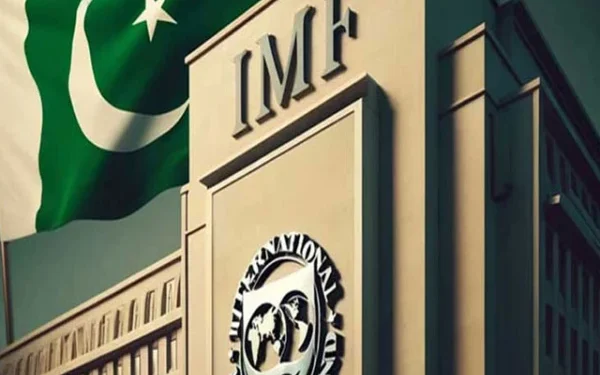Islamabad, The International Monetary Fund (IMF) has raised strong objections to what it considers a serious breach of Pakistan’s commitments under the $7 billion Extended Fund Facility (EFF) program. The violation, centered on the government’s decision to waive all taxes and duties on the import of 500,000 metric tons of sugar, has sparked significant controversy both domestically and internationally.
The IMF has rejected Pakistan’s justification that the import is being carried out under a “food emergency,” pointing instead to a pattern of policy inconsistencies and fiscal indiscipline that directly contradicts the written agreements made with the global lender.
Background of the IMF Program
Pakistan entered into a $7 billion agreement with the IMF under the EFF to stabilize its struggling economy, restore investor confidence, and implement deep-rooted structural reforms. One of the core components of the program includes the removal of tax exemptions and subsidies, particularly in the energy and commodities sectors, to improve revenue collection and reduce the fiscal deficit.
In return, Pakistan receives phased disbursements of IMF funding, subject to periodic reviews. The program also requires strict adherence to commitments involving fiscal consolidation, enhanced tax mobilization, and governance reforms within state-owned enterprises (SOEs).
Violation Through Sugar Import Policy
According to insider sources, the IMF was caught off guard by Pakistan’s recent decision to waive all customs duties, sales taxes, and withholding taxes on the import of half a million metric tons of sugar. These tax breaks were implemented through three separate notifications issued by the Federal Board of Revenue (FBR), which lowered the applicable tax rate to just 0.25%, significantly below the agreed benchmarks.
This decision clearly contradicts Pakistan’s written commitment to refrain from offering new tax exemptions or preferential tax treatments without prior approval from the IMF.
Government’s Justification and IMF’s Rejection
Pakistani officials had attempted to frame the sugar import decision as part of a “food security emergency”, citing high domestic prices and fears of future shortages. However, the IMF has dismissed this rationale, noting that:
- The sugar import decision was made after the government had already allowed the export of 765,000 metric tons of sugar earlier in the year.
- The export caused a sharp surge in local sugar prices, which climbed past Rs 200 per kilogram for the first time in the country’s history.
- The crisis is seen more as a result of poor planning and policy mismanagement rather than an uncontrollable emergency.
The IMF’s concern lies not only in the fiscal implications but also in the credibility of Pakistan’s reform agenda. The institution views this move as backtracking on previous commitments, potentially derailing future reviews and disbursements under the program.
Internal Resistance Ignored
Sources from within the government revealed that the Ministry of Finance and the Federal Board of Revenue (FBR) had both opposed the decision. Officials warned that such a move would violate the IMF agreement and jeopardize Pakistan’s access to further tranches of funding.
Despite these warnings, the federal cabinet approved the summary, bypassing institutional checks and proceeding without the formal input or consent of the Ministry of Finance. This move has raised concerns about governance breakdowns and the lack of transparency in economic decision-making.
A senior official in the Finance Division anonymously stated, “We were clear that this was a red line for the IMF. But political pressures and sugar sector lobbying seem to have overridden economic logic.”
Potential Fallout for Pakistan’s IMF Program
The violation could have significant ramifications for Pakistan’s financial stability:
- Suspension or delay in upcoming IMF disbursements, especially at a time when foreign exchange reserves remain fragile.
- Erosion of investor confidence, both domestically and internationally.
- Strain in Pakistan’s relationships with other multilateral lenders such as the World Bank and the Asian Development Bank, who often align with IMF conditions.
- Risk of currency depreciation and inflationary pressures if the rupee comes under pressure from weakening reserves.
IMF officials have reportedly conveyed their dissatisfaction to Pakistani authorities in informal channels, and a formal communication is expected shortly, which may demand an immediate rollback of the tax exemptions and a review of fiscal planning.
Trading Corporation’s Tender and Ongoing Review
Meanwhile, the Trading Corporation of Pakistan (TCP) has already floated a tender to import 300,000 metric tons of sugar, with July 18 as the last date for submission of bids. The process, however, is now under review, and there are strong indications that the government is considering a complete reversal of the import policy, especially the tax exemptions for the private sector.
Officials close to the matter have hinted that Prime Minister Shehbaz Sharif has ordered a high-level review and directed relevant ministries to explore alternatives. A partial or full withdrawal of the policy could be announced following internal consultations with the IMF and legal advisors.
Sugar Mills Association’s Response
In an interesting twist, the Pakistan Sugar Mills Association (PSMA) has stepped in to offer a solution. The association has assured the government that it can begin the crushing season early to meet local demand and stabilize market prices.
PSMA representatives have argued that local production is sufficient and that the price hike was a result of mismanagement and speculative trading rather than a real supply shortage. If the government accepts their proposal, it could eliminate the need for sugar imports altogether, thereby mitigating the fallout with the IMF.
Experts Weigh In: A Crisis Rooted in Poor Planning
Economic analysts have described the situation as self-inflicted, pointing to short-sighted decision-making, poor inventory management, and lack of coordination between ministries as the key factors that led to the crisis.
Dr. Hafeez Pasha, a noted economist and former finance minister, said:
“This is a textbook example of policy inconsistency. First, you allow massive exports to benefit a select group, then you panic when prices rise, and finally you try to import at the cost of fiscal discipline. The IMF has every reason to be concerned.”
Challenge for the New IMF Mission Chief
The controversy comes just as Eva, the newly appointed head of the IMF mission in Pakistan, is preparing for her first program review. Experts believe this sugar import episode will severely test her diplomatic and technical skills, as she navigates between enforcing program conditions and accommodating Pakistan’s political realities.
According to insiders, Eva has expressed disappointment in internal IMF communications and is expected to demand corrective measures before approving the next tranche of funding.
Conclusion: A Test of Credibility and Commitment
The sugar import controversy has exposed the fragile balancing act Pakistan faces between economic necessity and political expediency. With the IMF watching closely and domestic inflation hurting citizens, the government must make tough decisions — not only to restore trust with international lenders but also to protect public interest.
The path forward will require:
- Transparent policymaking, based on evidence and long-term strategy.
- Immediate corrective action to realign with IMF commitments.
- Enhanced coordination between economic ministries, regulators, and political leadership.
Whether Pakistan can repair the damage and regain the IMF’s confidence remains to be seen. But one thing is clear: fiscal discipline cannot be compromised in the name of short-term fixes.

























